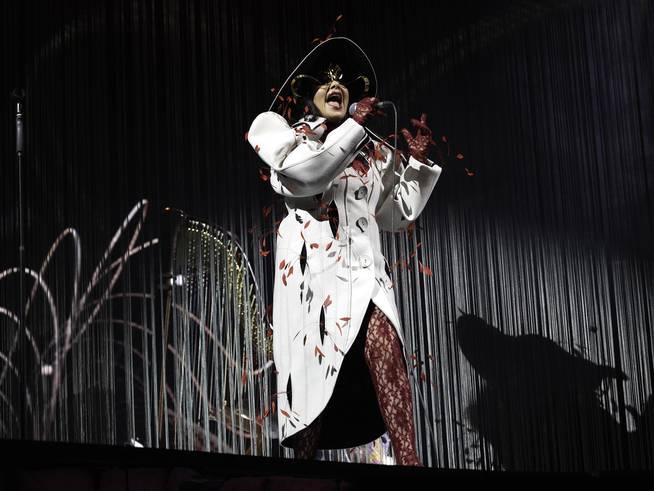Such as Björk and Rosalia They let us know on social networks, we can now hear – after several postponements – their long-awaited collaboration “Oral” starting this November 21st. As the Icelandic production company announced, it is a song (accompanied by an original music video created by AI) aimed at raising funds for the fight against mass fishing in Iceland. In fact, here we can hear both artists singing “Is the right thing to do” in some social media clip.
But no, this mysterious topic has nothing to do with fish or sea creatures. Here we tell you the true meaning of this song with a most intriguing title, which actually has to do with what you are probably thinking.
How the collaboration with Rosalía came about
“I’m offering a song of Rosalía and I singing together and the profits will go to support the fight against fish farms in Iceland,” is how Björk introduced this new song through her social networks last October, when it was supposed to be released. “The people of Seyðisfjörður have risen up and protested against the installation of a fish farm here. We want to donate the sales of this item and help with legal fines. We hope it can be an example,” he added.
But how did both stars end up collaborating and why specifically on this song? In reality, the Icelandic singer wrote it more than 20 years ago, between two of her iconic albums, Homogenic (1997) and Vespertine (2001). However, she seemed so “pop” to him that she didn’t fit into any of them. Even if he never managed to get it out of her, he couldn’t forget about it and remembered it recently, when the idea of re-recording it came to mind. “I thought, ‘Wow, the beat was very primitive, but I guess it was slightly inspired by Jamaican dancehall,'” he revealed to The Guardian.
In this way, Björk thought she could use it in her climate activism and, knowing that she and Rosalía admired each other, she proposed a more contemporary collaboration with the Catalan singer, with the help of the Irish-Scottish producer Sega Bodega. In fact, Björk emphasizes that she chose Rosalía because it is a style closely related to reggaetón, a style very present in Motomami (2022). Additionally, what finally gave meaning to this union is that the Icelandic artist sang this song at the age of 30, a vital stage that the “Saoko” singer is going through right now.
“When I heard it (the song), I thought: Rosalía has a lot of reggaeton on her album. I know she really cares and wants to act. I think she was excited about it because she wants to do something for the environment,” declared the artist.
Furthermore, the result could not satisfy the Icelandic production company more, even though it made us wait to see it. “One of the grunts that sounds like me is actually Rosalía. I think she was a beautiful audio reference for my voice. I feel very honored. She worked a lot to sing this. “I like the sound of our voices together,” Björk admits to Rolling Stone.

Bjork at her concert in Bologna (Italy) / Santiago Felipe
What does it mean Oral?
It all started when, after almost 20 years, Björk was trying to find the mysterious song again, which she couldn’t get out of her head, but she couldn’t remember its name either. “I’ve worked with the same person and record company since I was a child, and they always keep original copies of all the songs that are written. I asked them to try to find the subject,” Björk revealed to the Icelandic media Visir. For almost two decades, she couldn’t remember her name, but it finally came to her in a very unexpected way.
“It was disgustingly funny. I was in Australia last March and turned on CNN, which I normally never do. At that time there was a scandal in America, an aristocrat had met a prostitute or something, and the headline that came out was something like, ‘Was it just oral or was it total?’” I was like, ‘Wow, that’s the name of the song: ‘Oral.'” And I texted my manager and said: “Could you search the analog multitracks and find the song called Oral? (…) The strange thing is that the song was exactly as she remembered it. I liked it, but it was like a one-off thing that didn’t fit on any album or anything like that. And then this whole issue of open sea fish farming came up and I thought: “Oh, I’ll hand it over to activism,” the artist has revealed in media such as Visir and NME.
And the truth is that this makes sense with respect to the real meaning of Oralsince it is about desiring someone and wanting to go further.
“I think it’s great that Rosalía is singing and commenting on what I sing, that’s how an entry into the present is created. Also, the nice thing is that we are almost the same age when we first sing the song. We’re both talking about “oral,” about wanting to kiss someone, and it’s a bit like a time machine. I was in my thirties when I made it, and she is now too. From a musical point of view, it makes a lot of sense,” adds the artist to the aforementioned Icelandic media.
And you, have you heard what’s new from Björk and Rosalía?

![OMAR PEDRINI un concerto speciale “Che Ci vado a fare a Londra” [Info & Biglietti]](https://www.wecb.fm/wp-content/uploads/2023/11/1700659395_OMAR-PEDRINI-a-special-concert-What-Im-going-to-do-150x150.jpg)




